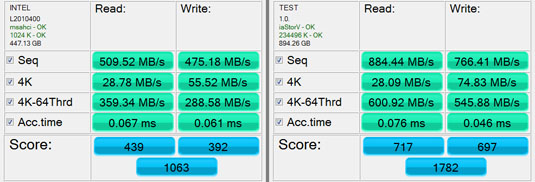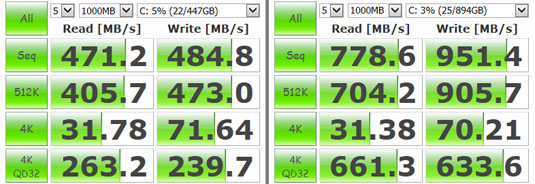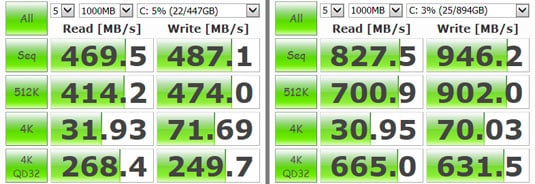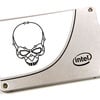This article is more than 1 year old
We test Intel's 730 480GB SSD Skulltrail scorcher
Enterprise grade storage for all?
Bigger is better
Intel quotes sustained reads up to 550MB/s and 470MB/s for the 480GB model while the 240GB has the same 550MB/s read performance but a lowly 270MB/s write performance. When it comes to Random 4K Reads, the 480GB is quoted at 89,000 IOPS and 74,000 IOPS for writes.

AS SSD test results: single drive (left), two drives in RAID 0 (right)
The 240GB drive has lower performance all-round when dealing with small files; 86,000 and 56,000 IOPS for reads and writes respectively.
Enough of what Intel claims the drives can do, let’s throw some benchmarks at them to see what they can actually do.
Starting off with the ATTO benchmark, the drive gave a sequential read score of 547MB/s which is pretty much what Intel claimed the drive could do. At 505MB/s, the sequential write test score of is a fair bit better than the official figure.
In CrystalDiskMark, the Sequential Read/Write scores were 471MB/s and 484MB/s, respectively. The benchmarks for compressed data produced a sequential read score of 469.5MB/s and 487.1MB/s for writes. Evidently, the controller isn’t too bothered whether the data is compressed or not.
I also did some real life testing, copying a 50GB folder of small files took a tadge under 10 minutes, a 17GB Blu-Ray image completed in two minutes 29 seconds and a 4GB image took 32 seconds. As Intel is aiming at content creation users, among others, I took the 4GB image and timed how long it took to open in Photoshop (2m 52s), re-image from 300dpi to 600pdi (17m 12s) and then save the resulting 16GB image it back to disk (14m 34s).

CrystalDiskMark uncompressed test results: single drive (left), two drives in RAID 0 (right)
Two's company
As Intel provided two 480GB drives, it seemed only polite that I should do some RAID testing with them. I built them into a RAID 0 array and then loaded Windows 7 Ultimate on it. Loading the OS took just six minutes as opposed to the 11 minutes on a solitary drive. Remember those ATTO scores for a single drive? When it comes to the RAID performance of the two drives together, things get pretty impressive. The Read score shoots up to 1GB/s while write climbed to 888MB/s. In CrystalDiskMark the read score went up to 778MB/s while the writes went to 951.4MB/s.
With the real life file transfers, the RAID array still took over nine minutes to copy the 50GB folder of files, which highlights how the 730 SSDs don’t really like handling small bitty files much. When it comes to copying the larger files, the array took some 10 seconds off the time to copy the 4GB image file and a huge 48 seconds off the BluRay file copy time.

CrystalDiskMark compressed test results: single drive (left), two drives in RAID 0 (right)
It was a similar story with the image manipulation. The image took 46 seconds less to open, took four minutes less to render and it was nearly five minutes quicker saving the file.
The Reg Verdict
It has been quite some time but at last we have a home-grown Intel 6Gb/s SSD for the consumer space, albeit for the higher end of this market segment. While Intel was beavering away to deliver the 730 range, the SSD space has become much more competitive even at the high end.
Indeed, the price of the 480GB 730 looks a tad steep when you consider a Samsung 512GB Pro can be had for around a tenner or so less – not to mention a 960MB Crucial M500 for maybe another 15 quid or so more. Still, the 730 series does have that enterprise grade endurance claim and, of course, you can expect a certain level of reliability that accompanies the Intel logo. ®


